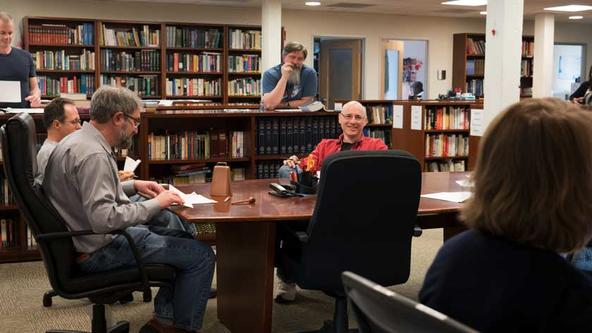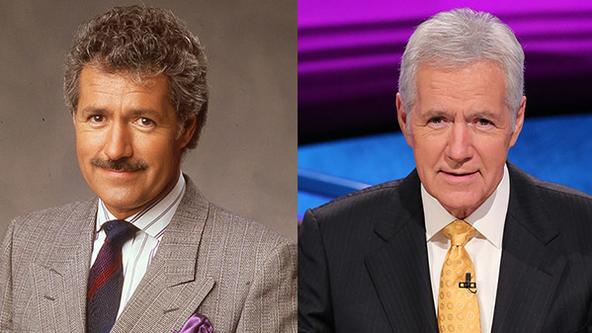Featured J!Buzz
by Billy Wisse, Jeopardy! head writer
Jeopardy!, with 32 years of syndication and millions of weekly viewers, is a cultural touchstone in living rooms across the country. This is due in part to the group of eight writers who create the categories and clues you see on TV every day. The writers are an Emmy Award ® -winning bunch as well as seasoned veterans who have all been at Jeopardy! for years, which creates a strong sense of family. Let me give you a sense of what it’s like to be a part of this exceptional team.
Before I was a writer here, I peddled my ill-crafted screenplays with no success. Simultaneously, I also did post-English-major jobs like bookstore employee, copy editor and ghostwriter. Then, one day, I responded to an ad in Variety for a Jeopardy! researcher. I passed the contestant test (which all prospective staff members had to take in those days) and was hired. The next six years were spent as a researcher/proofreader before a job opened up as a writer, which is standard procedure for promotion. Talk about putting in your dues!
To get the job of a Jeopardy! writer/researcher, one must possess a multitude of qualities. Among them, in rough order, are being detail-oriented, having a wide base of knowledge (we cover a lot of material at Jeopardy!), experience that helps in distinguishing good sources from bad, and a facility and instinct for responding to a problem by coming up with a solution.
Speaking of source checking, this is an area we put a lot of emphasis on, as there’s plenty of knowledge we must be sure is factually correct. To that end, unless it's a primary source like a quotation from a novel or the ingredients on the Pop-Tarts box, we rely heavily on strong secondary sources like the Encyclopedia Britannica, Oxford reference books and The New York Times. Then, of course, there are textbooks and specialized books and websites in various specific areas. Google Books is also a fantastic resource that gives us access to arcane works without having to go to the library and unearth them from the stacks. As you can see, the fact-checking side of a Jeopardy! writer/researcher’s job is serious business, and considerable time goes into making sure we present factually correct clues.
In clue and category creation, we typically create entire categories on our own. However, during the production process, categories may need to be patched (have a replacement clue inserted) and that patch can come from another writer. That said, during any given day, a Jeopardy! writer should typically be able to come up with two to three categories (14 to 21 clues). Tape days or reviewing games can throw this number off, though.
When creating clues and categories, inspiration can come from anywhere – new terms, people, subjects that enter the cultural landscape, or coming up with a new way to frame information that we’ve covered before. Sometimes there’s a visual aspect to creating categories. Other times, Jeopardy! talent like the Clue Crew and Alex Trebek can bring our clues and categories to life.
The most difficult category is the one that's so narrow you shouldn't have tried to write it in the first place, but by the time you realize there really aren't that many words containing the letters "V-Y-P," you're four clues in and can't bring yourself to cut your losses. The most difficult clue is sometimes one on a current topic that has to be written very carefully so you don't annoy any viewers. Again, maybe you're best off just writing about something else. A good way to hit the reset button is to take lunch and come back with a fresh approach. Most of the staff is aware that if they happen to have a spare onion ring, that can go a long way in refreshing my own perspective. The sense of family here is strong, so we all know how to bring out the best in each other and motivation exists in many forms.
For more on Jeopardy! categories, read this. Then visit our writers’ page where you can learn more about our team.




